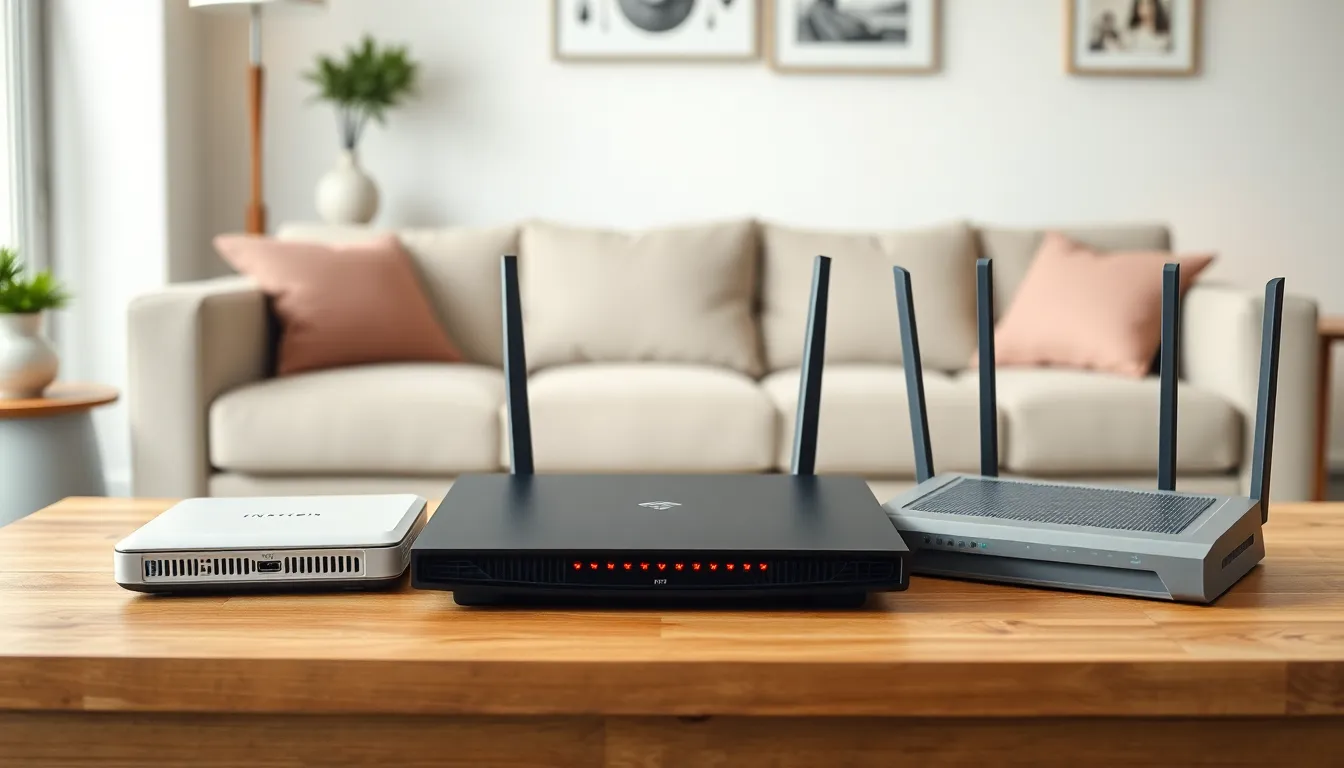Table of Contents
ToggleIn today’s hyper-connected world, Wi-Fi routers are essential for keeping homes and offices linked to the digital realm. These unassuming devices serve as the backbone of modern communication, enabling seamless internet access for everything from smartphones to smart home devices. With the rise of remote work and online entertainment, understanding the nuances of Wi-Fi routers has never been more important.
Choosing the right router can significantly impact internet speed, coverage, and overall performance. From basic models to advanced systems featuring mesh technology, the options are vast. This article dives into the key features and considerations for selecting the perfect Wi-Fi router, ensuring a reliable connection that meets the demands of any user.
Overview of Wi-Fi Routers
Wi-Fi routers serve as essential devices that connect multiple devices to the internet. They transmit data wirelessly, allowing laptops, smartphones, and smart home devices to access online resources seamlessly. With advancements in technology, modern routers deliver faster speeds, enhanced security features, and improved range compared to older models.
Key Functions of Wi-Fi Routers
- Network Distribution: Wi-Fi routers distribute internet access across several devices within a network. This sharing optimizes internet usage in homes and offices.
- Data Management: Wi-Fi routers manage data traffic effectively. They prioritize bandwidth allocation, ensuring high-demand applications receive adequate performance.
- Security Features: Wi-Fi routers incorporate various security protocols. Examples include WPA2 and WPA3, which safeguard against unauthorized access and cyber threats.
- Guest Networking: Many Wi-Fi routers support guest networks. This feature allows visitors to connect to the internet without accessing private networks.
- Parental Controls: Wi-Fi routers often include parental control settings. These settings enable users to manage and limit access to certain content for child safety.
Types of Wi-Fi Routers
- Single-Band Routers: Operate on one frequency band (2.4 GHz). They provide basic coverage and speed but struggle with multiple connected devices.
- Dual-Band Routers: Function on both 2.4 GHz and 5 GHz bands. They offer faster speeds and reduced interference, making them suitable for larger households.
- Tri-Band Routers: Feature an additional 5 GHz band. They enhance data traffic management and achieve higher performance in bandwidth-intensive scenarios.
- Mesh Routers: Employ multiple units that work together to expand coverage. They eliminate dead zones in larger spaces, ensuring consistent connectivity throughout the home or office.
Factors Influencing Router Choice
- Internet Speed: Higher internet speeds require routers capable of handling increased data traffic. Users should select routers that align with their internet service plans.
- Coverage Area: The size of the coverage area impacts the router selection. Larger spaces may necessitate stronger routers or mesh systems for optimal performance.
- Number of Devices: Consider the number of devices that will connect to the network. Routers with higher capacity handle multiple connections more efficiently.
- Security Requirements: Users should assess their security needs when selecting a router. Advanced security features provide greater peace of mind for sensitive data.
- Budget: Pricing varies across different router types. Users should evaluate their needs against budget constraints to find the best fit.
Types of Wi-Fi Routers

Wi-Fi routers vary significantly in capabilities and features. Understanding these variations helps in choosing the right router for specific needs and environments.
Single-Band Routers
Single-band routers operate on a 2.4 GHz frequency. These routers provide basic wireless connectivity suitable for light internet use. They support fewer devices simultaneously and experience interference from other appliances, such as microwaves and cordless phones. Single-band routers are cost-effective solutions ideal for small homes, light web browsing, and basic streaming.
Dual-Band Routers
Dual-band routers operate on both 2.4 GHz and 5 GHz frequencies. This feature allows users to connect multiple devices with reduced interference. The 2.4 GHz band offers broader coverage, while the 5 GHz band delivers faster speeds over shorter distances. Dual-band routers accommodate heavier internet usage and multiple users, making them suitable for larger homes and environments with numerous devices. They enhance activities like gaming and HD streaming by balancing network traffic effectively.
Tri-Band Routers
Tri-band routers include one 2.4 GHz band and two 5 GHz bands. This design reduces congestion and optimizes performance for high-demand environments. Tri-band routers excel in homes with numerous connected devices, streaming, and online gaming. They provide faster, more reliable connections by allocating traffic across three bandwidths. Users will find tri-band routers beneficial in maximizing their internet speeds in multi-user scenarios, particularly in smart homes with various IoT devices.
Key Features to Consider
When selecting a Wi-Fi router, key features significantly impact performance and user experience. Understanding these features helps in choosing the right device.
Speed and Performance
Speed and performance are vital. Look for routers with dual-band or tri-band capabilities for optimal performance. Dual-band routers support simultaneous connections on different frequencies, enhancing overall speed. Modern standards like Wi-Fi 6 (802.11ax) offer improved speeds, efficiency, and capacity for multiple devices. Ensure the router supports the internet speed provided by the service plan to avoid bottlenecks.
Range and Coverage
Range and coverage determine how well the Wi-Fi signal reaches different areas. Routers with high-gain antennas or mesh systems excel in extending signal range. For larger homes, mesh networks distribute signals effectively, eliminating dead zones. Evaluate the square footage coverage of the router to ensure it accommodates the entire living space.
Security Features
Security features protect the network from unauthorized access. Routers should support WPA3 encryption to enhance security. Advanced features like guest networks, firewalls, and parental controls provide additional layers of security. Regular firmware updates also enhance protection against vulnerabilities, ensuring a secure internet environment.
Top Wi-Fi Router Brands
Several brands dominate the Wi-Fi router market, known for their reliability and advanced features. Users can find a wide range of options tailored to diverse connectivity needs from these reputable manufacturers.
Brand A
TP-Link stands out for its affordable yet high-performance routers. Its Archer series includes dual-band and tri-band models suitable for various home sizes. Featuring advanced standards like Wi-Fi 6, TP-Link routers enhance speed and efficiency. Users appreciate features such as robust security protocols, intelligent QoS, and easy management through the Tether app.
Brand B
Netgear is recognized for its performance-driven routers targeting gamers and heavy users. The Nighthawk series provides advanced specifications, including high-speed connectivity and low latency. Features like dynamic QoS, MU-MIMO technology, and powerful antennas offer significant coverage improvements. Netgear also supports parental controls and cybersecurity features, making it a solid choice for families.
Brand C
Asus is well-regarded for its innovative designs and robust performance. The RT-AX series showcases Wi-Fi 6 capabilities, delivering exceptional speed for multiple devices. Asus routers often include features such as AiMesh technology for creating a seamless whole-home network and advanced security through AiProtection. Gamers benefit from built-in Game Boost technology, ensuring a smooth online gaming experience.
Choosing the right Wi-Fi router can significantly enhance connectivity and user experience in any environment. With various options available from single-band to tri-band routers, users can find a solution tailored to their specific needs. Prioritizing features such as speed, coverage, and security ensures a reliable internet connection for both work and leisure activities.
Investing in a quality router not only supports multiple devices but also adapts to the demands of modern online usage. As technology continues to evolve, staying informed about the latest advancements in Wi-Fi standards and security measures will help users maintain a fast and secure network. Ultimately, a well-chosen router can transform how individuals connect, stream, and communicate in their daily lives.




